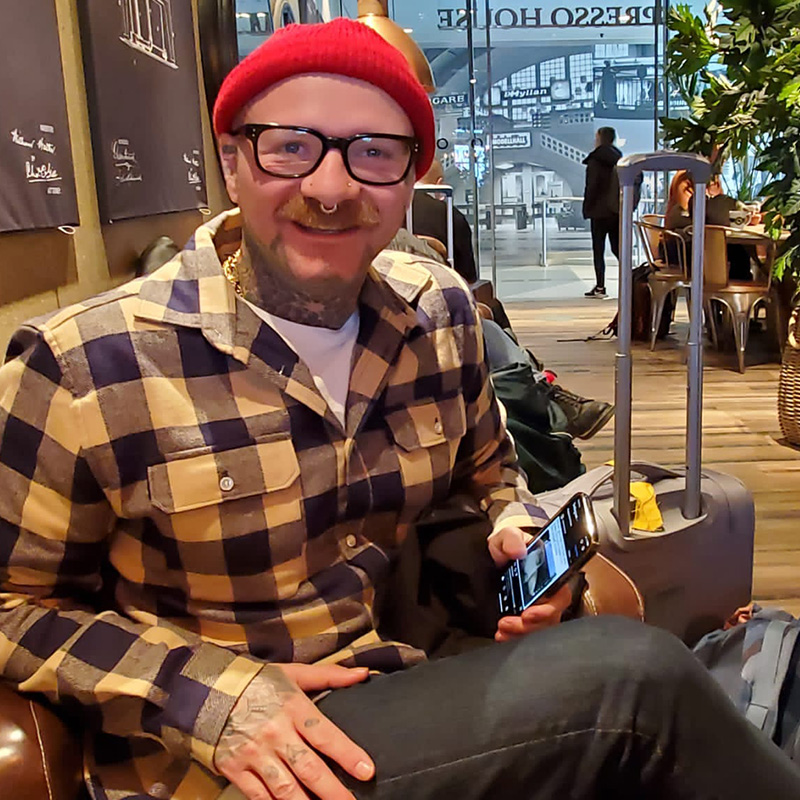
LGBTQ+ Pride Month
Profiles in Leadership: Joshua Lumsden, PA-C, An Advocate for Transgender Health Care
 Joshua Lumsden, PA-C, Lead Advanced Practitioner, Department of Primary Care, Virginia Mason Medical Center, Seattle "relaxes" on a camel at the cliffs in Petra, Jordan. Joshua Lumsden, PA-C, Lead Advanced Practitioner, Department of Primary Care, Virginia Mason Medical Center, Seattle "relaxes" on a camel at the cliffs in Petra, Jordan. |
In this edition of Insights, get to know Joshua Lumsden, PA-C, Lead Advanced Practitioner in the Department of Primary Care at Virginia Mason Medical Center in Seattle, Washington. Joshua shares how his work on suicide prevention protocols and care for transgender and gender diverse people further our goals of Diversity, Equity, Inclusion and Belonging.
When did you realize the importance of inclusion and belonging? How did that experience shape your attitudes and career path?
I was an odd little kid. I remember building a castle out of a hamburger and tater tots at school. Another kid took his hand and smashed it. I felt misunderstood and alienated in the process and felt profoundly different because of it. It was lots of things: coming from a poor family, early queerness and having a very young mother. Teachers, aunts and uncles advocated for me, created space and educated other kids that it's OK if you're different. Now, almost 40 years later, that's stuck with me and I feel for people, especially children who go through this.
 Joshua enjoys a coffee break. Joshua enjoys a coffee break. |
What attracted you to Virginia Mason Medical Center in 2016?
I conducted global health research as part of earning my academic degree and one of the co-instructors was a physician assistant at Virginia Mason. She was impressed with the project and asked me to consider working here. Through the interview process, the department of primary care involved everyone from the section head physician to advanced practice providers to RNs and the front desk staff. They all had a say in whether I would be hired. That reflected so positively because it meant that everyone's contribution was acknowledged and that my own voice would be heard throughout my career.
What makes you feel welcome and included at Virginia Mason and CommonSpirit Health?
Virginia Mason moved from being an independent organization to one now affiliated with a religious organization. We had reservations about how this would affect our patients, including our LGBTQ+ patients. I advocated and was assured that things would not change. There's a compassionate community of advocates who want to make sense of how to provide the best care for LGBTQ+ patients while honoring CommonSpirit’s Catholic identity. Things are going well and I feel my voice is respected nationally.
 Joshua hiking in Sweden. Joshua hiking in Sweden. |
How do you promote and maintain a sense of inclusion and belonging with your colleagues?
I do some work on development of clinical processes. I did a large project on suicide prevention to make sure that we're screening for suicide adequately and that we're developing a plan for every patient who indicates they're suicidal. I developed a draft but later learned that I hadn't included enough input from nurses. So when you're developing these system structures, anyone who has a hand in the work should have a say in how it's done. When that doesn't happen, the work suffers. When it does, our patients and our coworkers’ benefit.
Which job duty or initiative that you're involved in do you think will prove especially impactful in terms of diversity, equity, inclusion and belonging?
I do a lot of work on health care for transgender and gender diverse adults. Over the last six or seven years, we've made our program fairly robust. We know that when patients' pronouns are respected, suicidality scores go down. When patients have access to the care they need, whether it's hormones or just a listening provider, suicidality goes down. The rate of suicide attempts in people who don't have access to transgender health care is 40-50%, more among people of color. If any other condition — diabetes, heart failure, polycystic kidney disease — had this rate of suicide attempts associated with it, it would be considered a public health emergency. There are so many people who could die if we don't give this care. This is the cause that keeps me going.